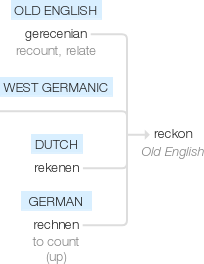Reckoning
Old English ( ge)recenian ‘recount, relate’, of West Germanic origin; related to Dutch rekenen and German rechnen ‘to count (up)’. Early senses included ‘give an account of items received’ and ‘mention things in order’, which gave rise to the notion of ‘calculation’ and hence of ‘being of an opinion’.
wiktionary
Gerund of the verb reckon, from reckon + -ing. Compare Dutch rekening, German Rechnung.
etymonline
reckoning (n.)
early 14c., rekening, "a narration, account," verbal noun from reckon (v.). The meaning "a settling of accounts" is from mid-14c.; that of "act of counting or computing, a calculation" is from late 14c. as is the sense of "a bill of charges" (in an inn, tavern, etc.). Compare Dutch rekening "a bill, account, reckoning," Old High German rechenunga, German rechnung, Danish regning "a reckoning, computation."
The general sense is "a summing up," whether in words or numbers. In nautical use from 1660s: "Calculation of the position of a ship from the rate as determined by the log and the course as determined by the compass." Day of reckoning is attested from c. 1600; the notion is of rendering an account of one's life and conduct to God at death or judgment.
